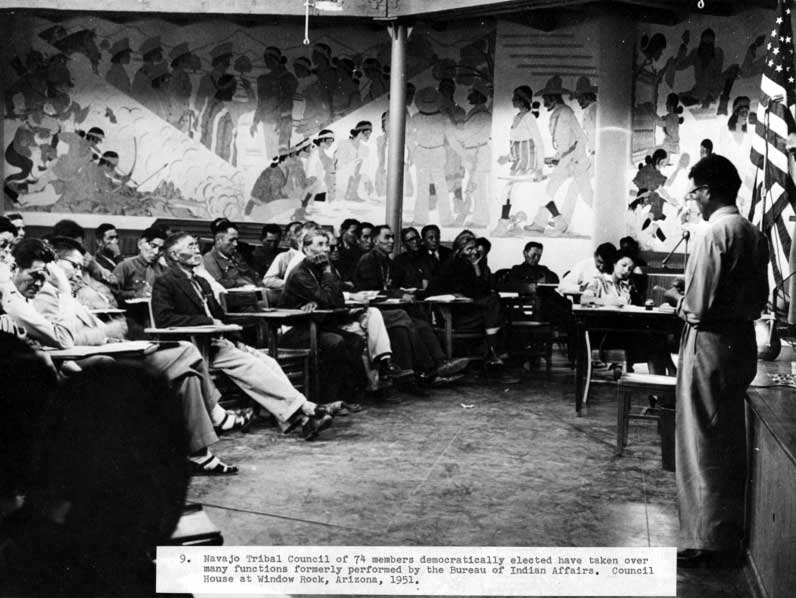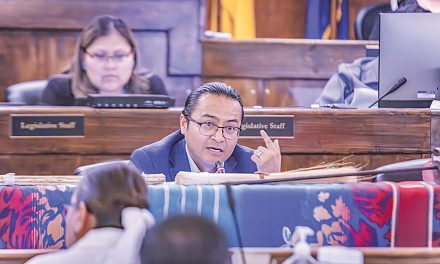
50 Years Ago – Delegate: Close Navajo Inn

The Navajo Tribal Council originally consisted of 74 elected members who took over duties that had been performed by the Bureau of Indian Affairs. (Photo of Council in 1951 courtesy of Truman Library.)
The Navajo Tribal Council Delegate Albert Ross told the governor of New Mexico, David Cargo, that he was sick and tired of watching his relatives die because of alcohol abuse.
“Have you ever seen an uncle of yours run over due to liquor? Have you ever seen his family so destitute that finally they, too, turn to liquor?” he asked Cargo.
Ross was one of several representatives from the tribe who met with Cargo in August 1967 to try to get him to push reservation border communities to accept responsibility for the misery they were causing Navajo families by promoting liquor sales so they could become rich.
The first step that needs to be done, one in which his chapter passed an unanimous resolution the previous Sunday, was to close down the notorious Navajo Inn.
The Navajo Inn was located on State Highway 264 less than a mile east of the Arizona-New Mexico border. It was the closest package liquor store to the reservation and was making a fortune off the misery of the Navajos.
Not everyone, however, shared his low opinion of the Navajo Inn.
Navajo Nation Police officials privately said the package liquor store may be doing more good than harm because it allowed reservation residents a place close to the border where they could buy liquor instead of going all the way into Gallup and getting drunk then driving back on State Highway 264.
In those days, ‘264 was considered to be a death trap at night and on weekends since it was only two lanes and none of it was lighted.
Persons traveling that road between Ya-Tah-Hey and Ganado at night took a major risk of being hit or run off the road by a drunken driver.
But Ross and other members of the Council pointed out that the Navajo Inn caused its share of the problems because it had a bar and people get drunk and then head for their homes on the reservation.
There was nothing they could do about the bars in Gallup but the Navajo Inn was so close that the Council members felt they should have the power to close it down as a public nuisance.
Jimmy Francisco, director of the Office of Navajo Economic Opportunity, told Cargo that studies done by the Indian Health Service could identify 3,000 chronic alcoholics living on the reservation and their liquor problems affected 20,000 homes and 40,000 children.
“We see people passed out drunk at bars, juveniles drinking, adults buying liquor for juveniles,” he said.
The Navajo police reported that 172 people had died of exposure in the past decade. They also pointed out that there were between 500 and 700 arrests each year for liquor violations.
After hearing the complaints, Cargo said he intends to stop package liquor stores from selling alcohol to minors and intoxicated people if he has to appoint 20 liquor inspectors to monitor their sales.
Cargo said he favors giving the Navajo government the power to close down bars adjacent to the reservation. (That never happened. The liquor lobby in New Mexico gave tens of thousands of dollars to the campaigns of state senators and representatives that this kind of proposal would never get out of committee).
Ernie Garcia, the owner of the Navajo Inn, was asked by the Navajo Times for a response to the allegations against his establishment and said he was willing to lease the bar to the Navajo Tribe and let tribal officials run it.(This also went nowhere)
The only concrete action taken during the meeting with Cargo was the creation of a 12-member committee, made up of tribal and state representatives, as well as two from the BIA, who would seek complaints from Navajos about the way the Navajo Inn and the Turquoise Bar near Shiprock was being operated.
That issue of the Navajo Times also carried a hard-hitting editorial, written by someone in the chairman’s office apparently, questioning how liquor dealers could justify making a profit off the misery of their customers.
“It makes your heart bleed for the owners of the liquor stores,” the editorial said. “Day after day, they have to step over drunks as they go in and out their doors. Day after day, they have to take a drunk’s money so he can get drunker.
“It’s a hard way to make a little money,” the editorial said. “It’s hard on the customer too — he is broke, beaten up and maybe in jail.
“Does this same liquor store proprietor even stop and think about his customer’s children? Do they have anything to eat? Or has Papa spent it all in the liquor store? What about his customer’s wife? If she is young enough maybe she can ‘make-out’ a little and get some money that way. If she is too old, there’s always welfare (that is, if she can get it).”
As for the kids, the editorial said, you can forget about their chances for a decent living.
“As soon as they are old enough, they too join the club. The teen-age boy can wind up in jail and the teen-age daughter can wind up pregnant,” the editorial stated.
To read the full article, pick up your copy of the Navajo Times at your nearest newsstand Thursday mornings!
Are you a digital subscriber? Read the most recent three weeks of stories by logging in to your online account.








 Highway 264,
Highway 264, I-40, WB @ Winslow
I-40, WB @ Winslow